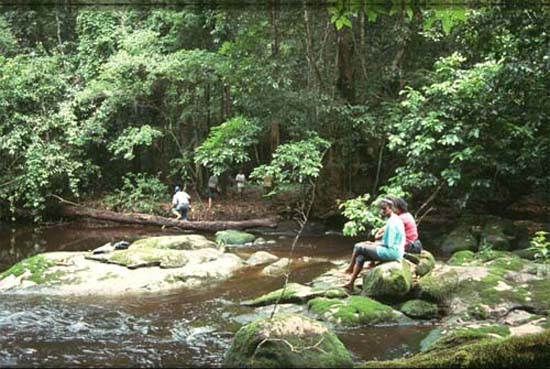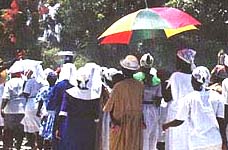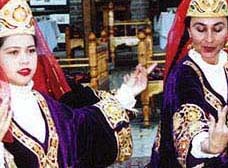
“Why did you choose to join the Peace Corps?” This has been the most frequent question I have been asked since my return to Whispering Pines. My answer is that I needed a change in my life. After consulting with my family doctor about what I wanted to do, he jokingly suggested that I get a dog. He said, “They always need care and attention.” We laughed at that suggestion and moved on to the benefits of accepting a challenge and knowing that you are never too old to help those less fortunate than yourself. Less than a year later I was on my way to Suriname.
Nancy O’Connell looks back on her service in Suriname
Peace Corps: O’Connell Shares Experiences
BY NANCY O’CONNELL: Special to The Pilot
“Why did you choose to join the Peace Corps?”
This has been the most frequent question I have been asked since my return to Whispering Pines. My answer is that I needed a change in my life.
After consulting with my family doctor about what I wanted to do, he jokingly suggested that I get a dog. He said, “They always need care and attention.” We laughed at that suggestion and moved on to the benefits of accepting a challenge and knowing that you are never too old to help those less fortunate than yourself. Less than a year later I was on my way to Suriname.
I didn’t have to look past my own family to know the value of joining the Peace Corps. My oldest daughter, Ann, served in Tanzania, East Africa, as a teacher, in the late 1980s. Her father, my late husband Stan, and I visited Ann in 1988 and experienced first hand the work of the Peace Corps. Her dedication, plus the esteem in which she was held by her students and neighbors, and her ability to adapt to life in a very poor country, made us very proud of her and the work she was doing. I am very glad we have this Peace Corps experience to share, even years apart in service, we will always be able to talk about our experiences in the Peace Corps.
It takes almost a full year to join the Peace Corps. It was my first involvement with joining anything to do with the government and the paper work took forever. All medical records, dental exams, legal clearance, an FBI background check, letters of recommendation from my past employers, from a volunteer work supervisor and from a friend, and my Pharmacy College records, were all needed to complete the application. I made two visits to my recruiter at UNC-Chapel Hill.
These meetings explored issues of flexibility, adaptability, social issues, cultural awareness, and my motivation and commitment to Peace Corps service. The recruiter then worked toward finding a match that would best fit me with an assignment and would successfully nominate me to be a volunteer. Peace Corps Washington made the final match. A request for a volunteer with my skills and personal qualifications led to my serving in the country of Suriname, South America, in a HIV/AIDS government agency.
When my invitation arrived, I needed a few minutes to comprehend that Suriname was the country. Then I took a hard look at the map that was enclosed to identify just where in South America I would be serving. My request not to serve in a cold country, was fulfilled — Suriname is just three degrees from the equator — it would be summertime every day.
Suriname’s History
The country was originally Dutch Guyana until its independence from Holland in 1975 and has a population of 430,000, with 210,000 living in or near the capital city of Paramaribo, that rests on the west bank of the Suriname River.
There are many ethnic groups living and working together throughout the country. The tourist information guide provides the following details: “European settlers came in the 17th century, bringing African slaves with them. After slavery was abolished in 1863, contract laborers from China, India and Indonesia were brought to Suriname.
There is also a small Jewish and Lebanese representation. In the interior there are Maroons, who are descendants of the African slaves, as well as 12,000 descendants of the original Amerindian inhabitants who first settled in Suriname.
Training Days
I met my fellow volunteers, 32 in number, in Miami, Fla., where our training began. We were a transition group. This meant it was the first time single volunteers would serve in Suriname.
We were a mix of married couples and single men and women, with only three of us in the “senior” category. The program was being expanded so that volunteers could serve in the city as well as in the villages.
Time was not wasted when we arrived in Suriname. Even though we arrived at 2 a.m., the call to breakfast was sounded at 7 a.m. and continued for the next seven weeks. Due to budget cuts in Washington, we received only seven weeks of training instead of the 12 usually provided.
Our language training suffered the most. Dutch is not an easy language to learn so the cutback in lessons was significant. The classes provided us with the technical skills along with information about the local culture and traditions needed to live and work within the country of Suriname.
There is also a four-week home stay during which each volunteer lives with a Surinamese family, in the city, or in the hinterland, depending on the assignment.
My fellow volunteer, Gay Pfister, and I were welcomed into a wonderful home. Our host was a widow, the mother of five grown children and a wonderful cook. We had the best home-cooked meals in Peace Corps Suriname. Her home was very comfortable. Gay and I each had our own bedroom, and we were able to walk every day to our training, two miles each way. Her children opened their homes to us, inviting us to dinner many times.
Every Sunday we would be taken to visit some of the historical sites and enjoy a picnic lunch with our host, her family and grandchildren. This family showed us how a family lives and works together in Suriname.
Assignment
I really felt in my heart that I would not be assigned to a village — age does have its privileges. I really didn’t want to deal with bathing in the river, doing dishes and washing clothes in the river or having only outside plumbing — you know, the kind that doesn’t flush.
As it turned out, my fellow seniors and I pooled our living allowance money and rented a two family home, on a paved street. Gay Pfister and I lived upstairs in an apartment with three bedrooms. There was no hot water or air conditioning but at least it had all the indoor amenities. George Gragg had a similar one-bedroom apartment on the first floor. We were quickly nicknamed the senior “Three’s Company.”
The village sites are mostly in the hinterland, and the younger Peace Corps volunteers traveled far and wide to their sites. One site required a fly in on a single engine plane.
Others had long trips in Daf trucks, on roads that are not paved and are full of potholes, and then transferring to a canoe for a trip up the Suriname River to their post. They also needed to return to the city at least once a month for provisions. They do not have refrigeration on site, so they needed to shop carefully for their staples. I know they ate lots of chicken, rice, and pasta, cheese and fruits and vegetables for as long as they could last in the heat of Suriname.
Gay and I enjoyed having them at our home whenever they came in for supplies.
It became clear to me after several weeks that I could adjust to living in the city of a developing country, and that I could live without air-conditioning, fancy bathrooms and huge grocery stores. Most everyone spoke English and were very patient with my less than basic Dutch. Although we were not allowed to drive a car, I could ride a bike. Riding a bus and walking would be my primary means of getting around. That when I called for a taxi I would be told the color of the car, and I would hop into the back seat, and with confidence I would give my destination and arrive safely.
Over the two years, Gay and I called the same taxi company and the drivers became very protective of us, most especially at night, always making sure we entered our home before they drove away.
As to riding the bike I must say that was an adventure. I had not been on a bike since I was 16, and riding on the left in traffic was an additional challenge. However, my agency lent me a bike and encouraged me to take on the adventure. I finally ended up only riding at times of low traffic, late in the afternoon or on Sunday morning going to church. I am sure the drivers in every car steered clear of me, just like I was working so hard to stay out of their way.
HIV/AIDS Work
The agency I was assigned to, Stg. Mamio Namen Project, was created to help those suffering from HIV/AIDS, and for their families. Mamio means quilt in Dutch and the making of a Mamio is a way in which those who are left behind can work through the grieving process and learn to accept the death of a loved one from this terrible disease. A remarkable lady, Tante Trees, lovingly made the quilts with the mementos brought in by the victim’s families.
The scope of Stg. Mamio expanded through the years and is now the front-runner in providing education to prevent the spread of HIV/AIDS.
They have a program that is presented each week through out the school year to all grades three to 12. They visit the medical clinics once a month with an adult program that speaks about HIV/AIDS, as well as, all the socially transmitted diseases (STDs). When not on the road delivering the message, they provide counsel and guidance to people living with HIV/AIDS.
They have developed organized support groups and they work alongside and help other social organizations. Presenting workshops, conferences and training sessions, also play an important role in the day-to-day work of Stg. Mamio.
Daily visits to the local hospitals to bring comfort to patients in the last stages of life were shared by all of us. Often their families abandon these patients; they are no longer welcomed as a family member due to the high incidence of stigma and discrimination that prevails in the country of Suriname. Often Stg. Mamio generously provides the cost of the funerals.
If I could identify one action that defines my work with this agency I would say it was in August 2004. I had just returned from my 30-day leave to the United States and started back to work. The office told me that a young man that I had visited very often in the hospital would ask each time they visited “where is the American lady with gray hair.”
I headed directly to the hospital. He was very weak but welcomed my visit and drank slowly the cold drink I had brought to him. We chatted about my visit home, talked about soccer (a sport he loved) and in due time we said our good-byes, always with a gentle touch and a smile. I was truly saddened that this young friend of mine died the next day. He was much loved, and at his funeral I was able to meet his parents and express my joy in having him as a friend and my sorrow in the loss of their son.
The director of Stg. Mamio is Ethel Pengel, the first person in Suriname to publicly reveal that she is HIV positive. She has been positive for over 25 years. Ethel is a dynamic speaker and is a very well respected spokesperson for people living with HIV/AIDS. She has dedicated her life to educating any and all who will listen to her words. I would carry her briefcase anywhere, anytime. We never walked a street in Paramaribo that she wasn’t recognized, and she always had time to answer questions or offer words of comfort. She has spoken to conferences in Beijing, China, in Africa, and throughout South America. Ethel is a valuable member and also serves on the board of the Caribbean Regional Network of People Living with HIV/AIDS (CRN+).
Full Days
My days were full with worthwhile endeavors. My digital camera was always with me and my Print Shop Deluxe program was one thing I used every day. I did a lot of PR work, providing posters to be displayed at World Aids Day, or the Candlelight Marches that happened twice a year, or making Power Point presentations for the education programs. I had never written a grant proposal but I learned the routine very quickly. The results were wonderfully successful.
A Canadian Crossroads volunteer and I wrote one together in order to obtain a laptop, a beamer and a projection screen — it took a few months but it was approved providing much needed visual support to all of the education programs. Each Peace Corps volunteer has an opportunity to apply for a small grant that will provide money to support a need within their agency or the work that they do in the village. Fortunately my request was granted and the money was used to buy a new sewing machine, yards and yards of muslin to make storage bags for the quilts, a digital camera to photograph the quilts, and money to have photos made for cataloging the quilts.
Stg. Mamio and its education programs were limited to the city of Paramaribo because of lack of transportation. Having nothing to lose, I wrote a proposal looking for help in buying an automobile. Within a week we were gifted with a 1999 station wagon from a local auto dealership in Paramaribo, that is providing insurance and maintenance for one year.
Coming Home
Prior to returning to the States we attended a “close of service” conference that prepared us for our return to the real world.
We met at Palumeu a village resort area that is situated in the heart of the rain forest, at the mouth of the Tapanahony River, and is just about 170 miles above sea level.
To travel to Palumeu by a river boat (long slim canoes) would be eight to 12 days because of the many large rapids and, the level of the water, so flying is really a luxury.
We needed two planes to transport all 26 of us plus all the supplies for a five-day stay. It was fun to fly over Paramaribo, and most especially to fly over so many of the villages that the younger Peace Corps Volunteers serve in.
Cameras were busy the whole flight recording the moment when one or another volunteer would shout, “I live there” in Balin Sula, or Bigi Poika, or Moengo.
I didn’t fish or do the hike through the rain forest — it becomes very difficult near the end. I decided to stay put and build up some hammock time with a good book.
However I didn’t miss the river boat trip that brought us to a clear spot that looked out on the Peleuwime rapids. The boatman and the guide prepared a barbecue of chicken, beans, fresh fruit, and rice. Huge ice chests held cold drinks for everyone. The hit of the day was walking the rapids and taking a canoe trip up river, jumping into the river and floating back to the beach. We had to wear life jackets (a Peace Corps requirement) we were all like little kids again with great fun and laughter all around.
All in all it was a marvelous way to end our two years of service in Suriname. It was the last time we would all be together and this opportunity to say good-bye was done just right. We received our certificates and we all agreed, it may be the end of our volunteerism in Suriname, but it will never end in our hearts and minds.
Sharing a home with Gay and George was just a great gift for each of us, and one that was unexpected. I was the oldest one serving in Suriname but there was never an age gap, only a shared knowledge that from age 21 to 70, we were all proud to be serving our country in such a special way.
Nancy O’Connell, who compiles the Fairway Notebook for The Pilot, has recently returned after serving in the Peace Corps for two years.












